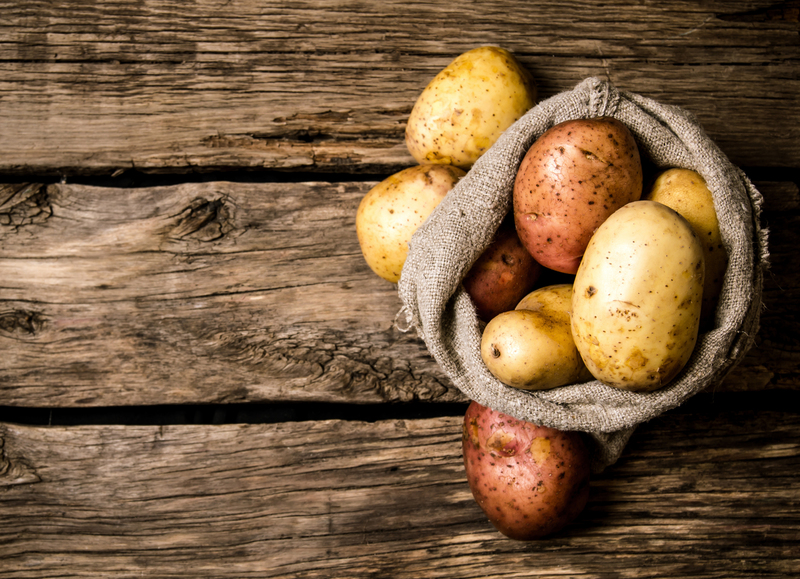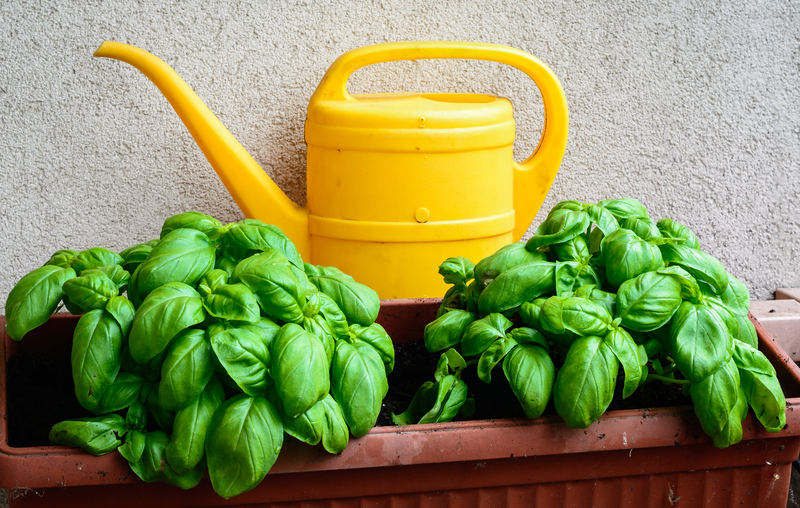Kickstart Your Gardening Journey: 9 Essential Tips for New Gardeners
Posted on 20/06/2025
Kickstart Your Gardening Journey: 9 Essential Tips for New Gardeners
Ready to transform your outdoor space into a thriving green sanctuary? Embarking on a gardening journey is an exciting, rewarding hobby that offers numerous health and environmental benefits. But before you break out your trowel and gloves, discover these essential tips designed especially for beginner gardeners! Whether your interest is flower gardening, vegetable planting, or growing a lush lawn, these expert gardening tips will set you up for success.
Why Start Gardening?
Gardening isn't just about plants; it's about nurturing life, beautifying your surroundings, reducing stress, and even enjoying fresh produce from your own backyard. Many new gardeners find a sense of accomplishment and joy in watching their gardens flourish. Plus, gardening connects you with nature, boosts physical activity, and supports biodiversity.
However, getting started can often feel overwhelming. With a countless array of plants, tools, and techniques, how do you know where to begin? Below, we've outlined nine essential gardening tips to help you kickstart your gardening journey with confidence!
1. Choose the Right Garden Location
Location is key to gardening success. A successful garden depends on selecting a spot that offers optimal sunlight and accessibility. Most vegetables and flowering plants require at least 6 to 8 hours of direct sunlight per day. Observe your yard or balcony at different times to determine the sunniest spots.
- Easy Access: Choose a site close to a water source and your house to make maintenance easier.
- Soil Drainage: Avoid areas where water tends to collect after rain, as soggy soil can harm plant roots.
- Protection: Sheltered locations can protect delicate plants from strong winds.
Pro Tip:
If space is limited, consider container gardening or raised beds. These are excellent alternatives for urban gardeners and beginners alike.
2. Test and Improve Your Soil
One of the most overlooked gardening basics is soil quality. Healthy soil = healthy plants! Before planting, use a simple soil testing kit to check the pH and nutrient levels of your soil. Most garden centers and cooperative extension offices offer soil tests.
- pH Level: Most plants prefer a slightly acidic to neutral soil (pH 6.0-7.0).
- Amend as Needed: Incorporate organic compost, manure, or peat moss to improve texture and fertility.
- Mulch: Mulching helps retain moisture, suppress weeds, and keeps the soil cool.
Why Soil Matters
Your plants will only be as healthy as the earth they grow in. By paying attention to soil quality, you'll promote stronger roots and increase the likelihood of a thriving garden.
3. Start Small and Simple
Don't bite off more than you can chew! New gardeners often make the mistake of planting too much too soon, leading to a feeling of overwhelm. Kickstarting your gardening journey the right way means starting with a manageable plot or a few containers.
- Begin with Easy Plants: Sunflowers, marigolds, lettuce, radishes, and herbs are perfect for beginners.
- Monitor Progress: Fewer plants means you can focus on understanding their needs and quirks.
- Build Confidence: Watching your first plants thrive is the best motivation to gradually expand your gardening efforts.
4. Select the Best Plants for Your Climate
Your location's climate - also known as its hardiness zone - plays a huge role in gardening success. Not every plant will thrive in every area. Research which species are well-adapted to your climate before purchasing seeds or seedlings.
- Zone Guides: The USDA Hardiness Zone Map is invaluable for matching plants to your region.
- Native Plants: Local, indigenous plants typically require less maintenance and are more resistant to local pests and diseases.
- Consult Local Nurseries: Staff can offer practical advice on what grows best in your area.
Smart plant selection dramatically increases your gardening success rate and reduces frustration down the road.
5. Get the Right Gardening Tools
Investing in a few quality tools makes every gardening task easier and more enjoyable. While fancy gadgets aren't necessary, some basic tools are essential for anyone at the start of their gardening journey:
- Hand Trowel - For digging, transplanting, and mixing soil.
- Pruning Shears - For trimming and shaping plants.
- Watering Can or Hose - For consistent, gentle watering.
- Garden Gloves - To protect your hands from thorns, blisters, and dirt.
- Hoe or Weeder - Aids in breaking up soil and removing weeds.
Keep your tools clean and store them properly to prolong their lifespan and keep your gardening journey running smoothly.
6. Practice Consistent Watering
Watering is a crucial part of gardening success. Both overwatering and underwatering can hurt plant growth. The key is consistency:
- Morning Routine: Water your garden early in the day to minimize evaporation.
- Avoid Wet Foliage: Water roots rather than leaves to prevent mold and disease.
- Soil Moisture: Allow the soil to dry slightly between waterings to avoid root rot.
- Mulch Benefits: A layer of mulch retains moisture and keeps the soil temperature stable.
Watering Wisdom
Most gardens require about 1 inch of water per week, including rainfall. Adjust this based on your local weather and soil type.
7. Learn the Art of Weeding and Mulching
Weeds compete with your garden plants for water, nutrients, and light. Regular weeding is essential to give your chosen plants the best chance to thrive.
- Pull Weeds Early: It's easier to remove weeds when they are young and before they produce seeds.
- Mulch Heavily: A 2-3 inch layer of organic mulch suppresses weeds and feeds your soil as it breaks down.
- Stay Patient: Weeding and mulching are ongoing jobs, but their cumulative effect is undeniable for lush, healthy gardens.
Remember: Not every "weed" needs to go! Some wild plants benefit pollinators or help loosen the soil. Learn to identify your local flora.
8. Feed Your Plants Properly
Plants, like people, need nourishment to grow strong and healthy. While quality compost or organic matter provides vital nutrients, some plants, especially vegetables and annual flowers, may need extra feeding during peak growing seasons.
- Slow-Release Fertilizers: These supply nutrients over time and reduce the risk of burning plants.
- Liquid Feeds: Useful for fast-growing vegetables and container gardens.
- Compost Tea: An eco-friendly liquid feed made by soaking compost in water.
- Follow Directions: Over-fertilizing can harm your plants, so always use the correct amounts.
Pro Tip: Observe your plants! Pale, yellowing leaves often indicate nutrient deficiencies, while overly lush, floppy growth can mean too much nitrogen.
9. Be Patient and Celebrate Progress
Gardening is a journey, not a destination. Plants need time to mature, establish roots, and produce blooms or fruit. New gardeners often become discouraged if results aren't immediate, but patience pays off.
- Take Notes: Keep a gardening journal to track what works, when you plant, and your garden's progress.
- Celebrate Small Successes: Every sprout, flower, or harvest is a win worth celebrating.
- Connect with Others: Join local gardening groups or online communities for encouragement and advice.
- Don't Fear Mistakes: Every gardener has setbacks. Learn, adjust, and keep growing!


FAQs: Essential Gardening Advice for Beginners
What are the easiest vegetables for new gardeners?
Lettuce, radishes, green beans, and cherry tomatoes are all easy-to-grow vegetables perfect for new gardening enthusiasts.
How often should I water my garden?
Generally, aim for an inch of water per week, but adjust based on your soil type, weather conditions, and the needs of specific plants.
Do I need expensive tools to start gardening?
No! Start with a few basic tools. As you gain experience, you can gradually invest in quality equipment tailored to your gardening needs.
Can I garden if I only have a small space or balcony?
Absolutely. Container gardening or vertical gardens are great ways to grow herbs, vegetables, and flowers in tight spaces.
Conclusion: Start Your Gardening Adventure Today!
Whether your goal is a bounty of home-grown produce, a vibrant flower garden, or simply enjoying time outdoors, gardeners of all levels benefit from a strong foundation of knowledge and enthusiasm. By following these 9 essential gardening tips for beginners, you'll build the skills and confidence to nurture a garden that brings you joy year after year.
Remember, every gardener was once a beginner. With a bit of patience, these key tips, and a love for nature, you'll soon discover the immense pleasure of watching your garden come to life. Happy gardening!
- Ready to kickstart your gardening journey? Share your first gardening experiences in the comments below!
- For more beginner gardening tips, be sure to check our other in-depth guides and resources.
Latest Posts
Master the art of cultivating your own herb haven
Unveiling the Secrets to Thriving Orchids
Captivating Zen Garden Designs for a Peaceful Backyard Retreat

